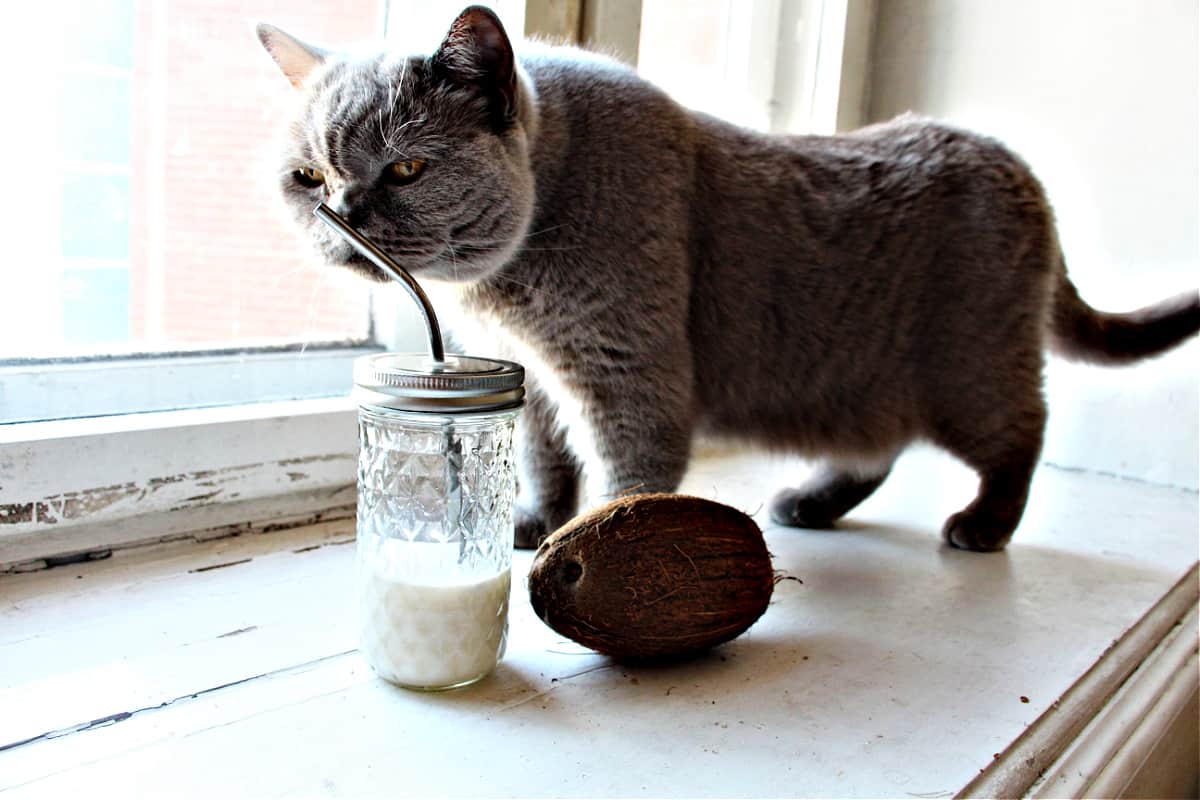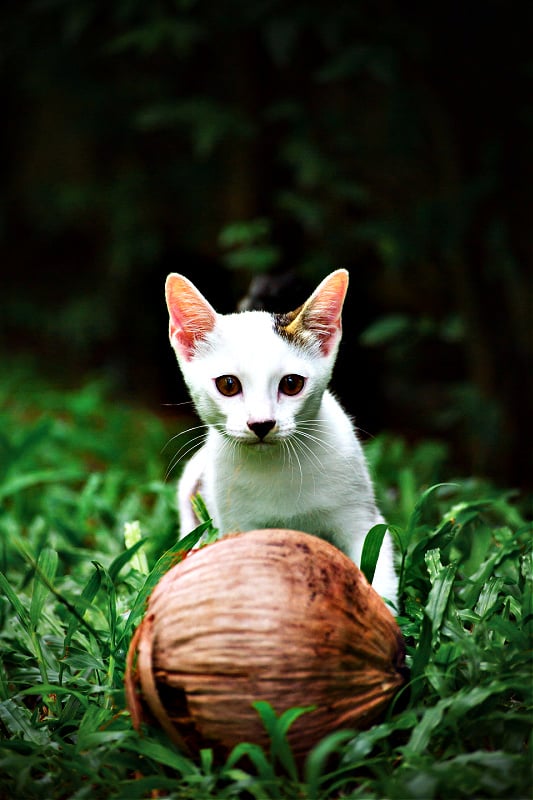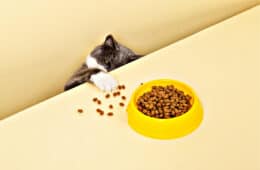Coconut oil is making waves in the human diet. But does it also belong in your cat's bowl? If you're scratching your head over this, you're in the right place. We're here to clear the air.
We'll start our journey with the basics. What exactly is coconut oil and how does it fit into a cat's life? Can your kitty, a meat-loving creature, actually benefit from this plant-based oil?
There's no shortage of online chatter suggesting coconut oil as a wonder cure for various cat ailments. But how true are these claims? We'll dig into the facts and seek expert opinions, including from pet nutritionist Dr. Martha Cline, DVM (Diplomate ACVN).
Does coconut oil pose any risks to healthy cats? Why does the ASPCA caution us against feeding it to our pets? And the most fun question - do cats even like the taste of coconut oil?
At the end of our exploration, you'll be in a better place to decide if coconut oil should make its way into your cat's diet. But remember, no matter what you decide, always check in with your vet first.
What Is Coconut Oil?
Coconut is a fruit produced by certain types of palm trees. Naturally growing along equatorial coastlines across the globe, coconuts provide local inhabitants with a rich source of nutrients. They also provide materials for furnishing and decorating.
A mature coconut contains transparent liquid (coconut water) and a thick layer of white flesh. Coconut oil is produced by processing that white chewy flesh until the oil content is effectively extracted.
While coconut oil is entirely plant-based, it is high in saturated fats. Unlike saturated fats from animal sources, coconut oil contains shorter chains of fatty acids.
This could make coconut oil easier to digest in humans and animals that suffer from certain medical conditions. Other than that, coconut oil mostly delivers calories and has properties similar to those of other oils and fats.

Is Coconut Oil Natural For Cats?
For humans living in the tropics, coconut is often a staple food. They consume large amounts of the fruit - including its oil - with no ill effect. However, as we all know, cats are obligate carnivores. Therefore, no plant-based oil can be a "natural" ingredient in a feline's diet.
This does not mean cats cannot consume coconut or that it's harmful to them in any way. It only means that it should not be touted as a "natural" food ingredient.
Where cats are concerned, coconut oil is not only highly processed, it's also not species-appropriate. There's nothing natural in supplementing a cat's diet with coconut oil.
Possible Uses For Coconut Oil In Cats
If you search the internet for the combination "coconut oil and cats" you will come across dozens of suggestions for using coconut oil in cats. Many discuss its use as a nutritional supplement for a variety of illnesses including skin disorders, gingivitis, constipation, and many others.
Some advocate its use as a topical remedy for a variety of conditions. Those conditions include fleas, fungal or bacterial infections, and even exposure to the elements.
Unfortunately, there is no evidence that shows that coconut oil is in fact effective in treating most of these conditions. The exception would be certain GI tract conditions where the shorter medium-chain triglycerides may be more easily absorbed in the cat's intestines.
Even then, the oil is used not as medication. Instead, it is used as a way to supplement the diet with extra calories in a way that may be more effective.
Pet nutritionist Dr. Martha Cline, DVM (Diplomate ACVN), told us that she sometimes uses coconut oil in cats to treat such conditions. "In some animals that potentially have malabsorption or maldigestion disorders, coconut oil could be beneficial," said Dr. Cline.
Even if you suspect your cat suffers from GI problems, do not supplement with coconut oil without discussing this with your vet first. A lot depends on the specific diagnosis and the cat's overall condition. Supplementing a sick cat with anything should only be done as part of an overall veterinarian-supervised treatment.
SIGN UP FOR THECATSITE'S EMAIL UPDATES >
Is Coconut Oil Harmful To Healthy Cats?
There is no indication that coconut oil is toxic to cats. It is considered safe for healthy cats when consumed in small amounts.
So why is it on the list of foods that the ASPCA suggests we should avoid feeding our cats? The ASPCA does say that "when ingested in small amounts, coconut, and coconut-based products are not likely to cause serious harm to your pet." However, like most oils, coconut oil can make the food move along more quickly in your pet's stomach. This can lead to upset stomach and diarrhea.
There's another risk associated with supplementing your cat's diet with coconut oil though: weight gain. As Dr. Cline told TheCatSite, supplementing the diet of healthy cats with too much coconut oil can lead to an unbalanced diet and even obesity.
"It’s not something I would recommend that an owner adds to a healthy animal’s diet", she said, adding that "90% of an animal’s total calorie intake should come from a complete and balanced diet. If you’re adding a lot of coconut oil you may skew that percentage."
Read more: Unbalanced Diets - Are You Killing Your Cat With Kindness?

But Wait, Do Cats Even Like Coconut Oil?
Fortunately, no, they don't. In this study, cats showed clear aversion to a diet that contained coconut oil. So much so that the cats preferred to go hungry and lost weight on food supplemented with coconut oil, compared to cats fed regular cat food.
So, Should You Give Your Cat Coconut Oil?
In the end, this is a personal choice. As long as your cat is healthy and you're only adding a small amount of coconut oil to a complete and balanced diet, you're probably not harming your cat. Just keep the following in mind -
- Coconut oil does not have any evidence-based benefits for cats (with the exception of specific cases of certain GI-tract diseases - under veterinary supervision).
- Cats don't like the taste of coconut oil
- Coconut oil is a highly-processed ingredient that's not at all natural for cats to consume
If your cat is healthy, he or she probably doesn't need supplementation with coconut oil. However, a small amount won't hurt them. If Kitty is ill, please don't turn to self-medicating at home with coconut oil or any other substance. It will most likely not help them and could mean delaying much-needed veterinary treatment.
To stay on the safe side, always consult with your veterinarian before supplementing your cat's diet with anything, including coconut oil.
Read more: Alternative Treatments For Cats: How To Minimize The Risk
Over to you, have you ever tried giving your cat coconut oil? Leave a comment and let us know how it went!
SIGN UP FOR THECATSITE'S EMAIL UPDATES >
Note: We may get commissions for purchases made through links on this page.




20 comments on “Should You Add Coconut Oil To Your Cat’s Food?”